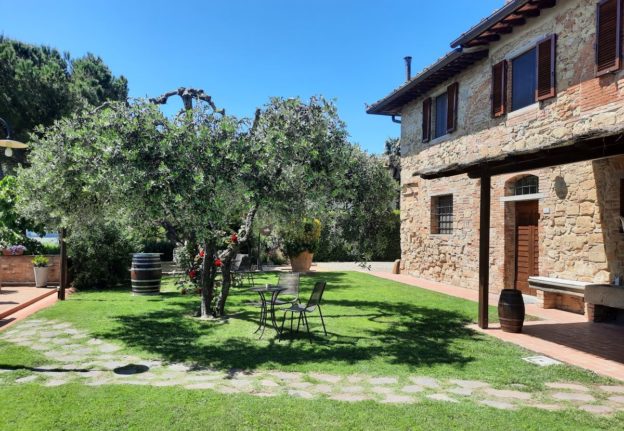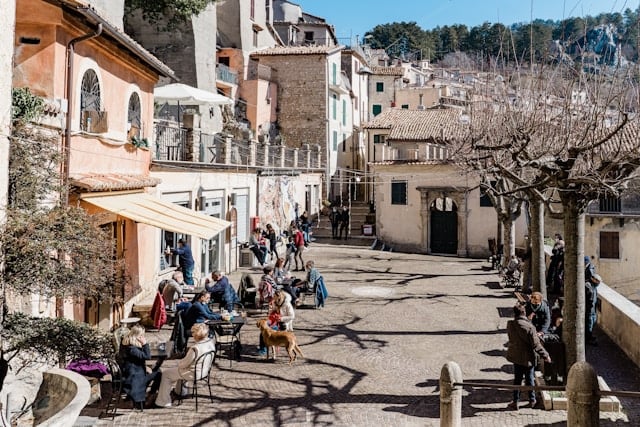Roger Morris, 47, and Stefania Levi, 41, escaped from post-Brexit London in 2016 and bought an old stone farmhouse in the tiny Tuscan village of Vico d’Elsa, in Chianti, near the iconic town of San Gimignano.
They swapped their long-time jobs in the corporate security sector for a slower-paced lifestyle, turning the cottage into both their new home and a small guesthouse with just a handful of rooms, called Villa San Michele.
“We wanted a change in our lives and financially we couldn’t have done what we had in mind in the UK, plus with my partner being Italian the weather was an issue,” Morris tells The Local.
After looking at dozens of properties, they felt confident they could negotiate a good deal.
“We very quickly learnt that the prices listed by agents in this area were wildly unrealistic, we felt we were able to make our own valuation and that is what we based our offer on the property, which was accepted. We had very clear on our minds that we wanted to create a B&B that we were able to run directly or with minimal external help”, says Morris.
READ ALSO: ‘What we learned from moving to Italy and opening a B&B’
After a nine-month long renovation project, the place had five en-suite rooms, a comfortable lounge area and garden with pool where guests could relax and have aperitivo.
The farmhouse was built in the 1600s and still has plenty of its original features and large gardens, though what particularly appealed to the couple was its location within a small village of barely 400 people.
“We are at walking distance from a restaurant, a pharmacy, hairdresser and a small grocery store, but at the same time there’s that feeling of being a countryside property: literally a few steps from our gate we can enjoy some amazing walks,” says Stefania.

Another plus point was the farmhouse’s low energy use and running costs, much lower than those of many other properties in the area, due to having photovoltaic panels and wood-chip heating. The purchase process was a long one compared to UK standards, says Morris, and on such a big property there are a lot of elements to consider so “getting good professional advice is imperative to navigate the infamous Italian bureaucracy”.
The couple has a few tips to share with those longing to purchase property in Italy, for example hiring a good commercialista (tax accountant) who’s fluent in English to avoid getting lost in translation, and being on the ground to follow the renovation work.
READ ALSO: ‘We bought the cheapest house in Piedmont and live mortgage free’
“Building works were pretty intense and dealing with trades not the easiest part,” says Morris. “It was fundamental that we were actively working on the building site to make sure everything was running smoothly, in a timely manner and according to our budget.”
The couple picked Vico d’Elsa for its location, close to some of Tuscany’s famous sights but at the same time far from the crowds, not within the noisy areas packed with visitors where restaurants are expensive and cost of living is higher by comparison.
“Particularly in the area where we are located, you can still go out and have a great pizza for €8 and half a litre of pretty decent house wine for €6.
“When friends and family visit from the UK or even from other parts of Italy they are always pretty shocked – and we are always shocked at the UK prices when we do go back”, says Morris.
The B&B is open from March to December, meaning Stefania and Roger work seven days a week during that season with practically no staff to help them.
While winter months are for unwinding, holidays and getting the property ready for the reopening. Maintenance is key.
READ ALSO: ‘Research and more research’: How do you choose the right part of Italy to move to?
“We repaint the entire inside of the property every year and revarnish all the wood, of which there is plenty, with a view that our guests should feel the property is brand new when we open again each March,” says Stefania.
In winter the area becomes much calmer but the village is never totally abandoned as local residents live there year-round.
“Unlike many other villages in our area, here there are no second homes so the community feel is still very much alive”, she says.
With their previous jobs they didn’t have such seasonality, and their lives were the typical Monday-to-Friday office schedule, and weekends with friends and family. Their holiday and free time were very restricted.
The couple believe that living at the same property they also run as a guesthouse is key to ensuring high-quality, tailored services to guests. Being on the ground ensures better client experiences and makes stays warmer and authentic.
“We are always available on site whether it is for a chat after a day visiting, for a glass of wine before going out for dinner or for anything our guests may need”, says Morris.



 Please whitelist us to continue reading.
Please whitelist us to continue reading.
Member comments